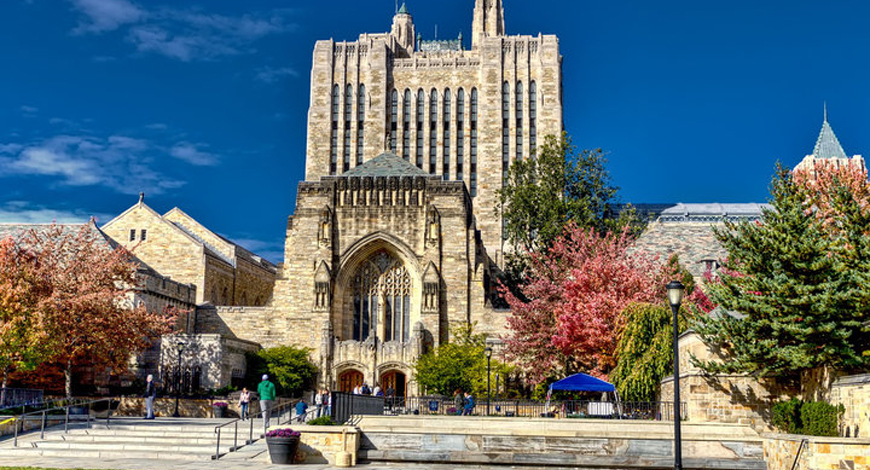常青颂
The annual Yale Commencement is always held on the last Monday of May, which is the Memorial Day. It usually lasts for three days from the preceding Saturday to Monday. All degree candidates一undergraduates, as well as candidates from the Graduate School and the University's professional schools-participate in the ceremony. The ceremony takes place outdoors, rain or shine, on Yale's historic Old Campus, in order to accommodate the more than 10,000 friends and family members who wish to attend.
一年一度的耶鲁毕业典礼总会在五月的最后一个星期一如期举行,这一天是美国的"阵亡将士纪念日"。通常,毕业典礼从之前的那个周六持续到周一,历时三天。 所有即将获得学位的耶鲁学生,包括本科生、研究生院及其他专业学院的毕业生都会参加这个盛典。不论晴雨,庆典都会在老校园露天举行,以容纳前来参加毕业典礼的学生家长及朋友,通常有1万多人。
Class Day, which also takes place on Old Campus on the second day of the commencement. It includes the awarding of academic, artistic, and athletic prizes, the celebration of Yale College traditions, and an address by a notable speaker. Class Day lasts approximately two hours.
庆祝活动的第二天称为"毕业生日",也在老校园举行。"毕业生日"的活动包括: 颁发学术、艺术、运动奖项;耶鲁学院的传统庆祝活动;以及一位名人致辞。整个活动将持续近两个小时。

Class Day traditions include a student reflection, a poem, a class history, the planting of the Ivy, and the dedication of class stone. The occasion has both a serious and a celebratory air. Members of the class come together at the end of their college experience to listen to a distinguished speaker charge them for the future, celebrate classmates' distinction, and share memories. The event concludes with the alma mater "Bright College Years" and the waving of white handkerchiefs for the final line of the song.
传统节目,诸如回忆学生生涯、诗朗诵、班级回顾、种植常青藤,以及捐赠班级纪念石。现场既庄严又不乏喜庆气氛:在学生生涯即将结束的时候,同届的校友走到一起,聆听做演讲的同学对未来的憧憬,调侃这一届学生的与众不同,分享共同的美好回忆。最后,整个活动在校歌"美好的大学时光"中接近尾声,唱到最后一句时, 同学们挥舞着白手帕,对美好的大学生活说再见。
One Class Day tradition is the reading of an original poem describing the connection between the growth of the ivy vine and the flourishing of the graduating class. The poem is called Ivy Ode and composed by a selected graduate. Traditionally, the Ivy Ode had been read in both Latin and English for hundreds of years. As part of a more modem ritual, the Ivy Ode may be translated into a foreign language rather than Latin. For instance, the 2005 Ivy Ode was recited in Spanish, and the 2006 poem in Ancient Irish. The most exciting thing is that the school authority decided the 2007 Ivy Ode to be read in Chinese other than English. It was so great a surprise that 6 of the YC'07 Chinese students volunteered to translate the original English poem into Chinese, which was polished by Taisu Zhang, a 2005 Yale alumni of Timothy Dwight College. It was the first time for an Ivy Ode to be read in Chinese and the poem was so beautifully translated that it has moved many Chinese students, motivating them to apply to Yale:
"毕业生日"有个传统,每年都要朗诵一首描写常青藤的成长与毕业班的成长之间关系的原创诗歌。通常是挑选一位优秀毕业生,由他/她创作,这首诗歌就叫《常青颂》。几百年来,《常青颂》都是用拉丁文和英语朗诵;近些年,又形成了将其翻译成另一种外语来代替拉丁文的惯例。比如,2005年的《常青颂》采用了西班牙语,2006年则用古爱尔兰语朗诵。最令人兴奋的是,2007年的毕业典礼上,校方决定,将当年的《常青颂》译成汉语与英语一同朗诵。得知这个天大的惊喜,2007级的6名中国毕业生主动承担起将英文原文译成汉语的任务,并请毕业于蒂莫希德怀特学院的2005级校友张苏泰完成润饰。这是耶鲁历史上第一次用中文朗诵《常青颂》。译文如此优美,打动了无数中国学生,激励他们申请去耶鲁读书:
The gate swings open, and minutes pass/ Someone cracks a joke、3-the last/ Heard as a student / Four years ago, this stage was far / Now could we get there from where we are / Well, who wouldn't?". The stories of our hands explain/ A common bond that must remain / Though we are gone- / We are the grass, we are the rooms / The silent marching that resumes / Its slow, proud song.
大门缓缓敞开,时光悠悠流逝/学子彼此的笑语欢声/即成往事/遥想当年,这个舞台何其遥远/回首间,谁不奢望/时空倒转,昨日再现? /……我们的故事,默默铭记/那共享的情谊,心中的灵犀/我们虽然离开--/但我们是这里的青草,这 里的高塔/是悠扬、骄傲的歌声里/沉默前行的步伐。
The tradition of planting the Ivy began in 1852, when the first ivy vine was planted near the wall of what is now Dwight Memorial Chapel.
种植常青藤的传统始于1852年,第一棵常青藤就种在现在的德怀特纪念堂墙角。













